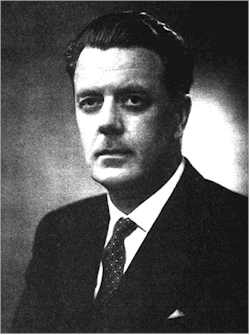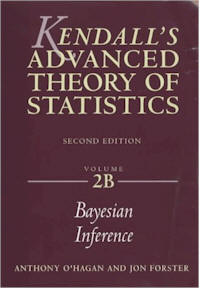Maurice George Kendall
Born: 6 Sept 1907 in
Kettering, Northamptonshire, England
Died: 29 March 1983 in Redhill, Surrey, England
EDITOR'S NOTE:
We found this biography of Old Centaur Maurice Kendall on the internet
and thought it worthwhile reproducing here. Maybe someone will
remember him if they are 100 years old! Maurice was at Hastings Street
when Mr. Slater was the Headmaster. This is therefore our oldest Old
Centaur biography!
Maurice Kendall's father, John Roughton
Kendall, was an engineering worker who was brought up in Kettering,
while his mother was Georgina Brewer who came from Hertfordshire. As a
young boy Maurice sometimes helped his grandfather who owned a public
house, The Woolsack, in Kettering. It is rather a miracle that Maurice
ever survived to adulthood, for he contracted cerebral meningitis, a
disease which at that time was almost always fatal.
 His
time at Central School His
time at Central School
In 1914 World War I started and
Maurice's father moved to Derby to work for Rolls Royce. It was in Derby
that Maurice received his early education but he showed little signs of
the great academic achievements which were to come. He sat the entrance
examinations for Grammar School but did not gain admission, so he went
to Derby Central School. His early interests were in languages
but near the end of his secondary schooling he began to show an aptitude
for mathematics. The Headmaster of the Central School must be given much
credit for making the highly unusual move of arranging for Maurice to
attend the Grammar School in his final year.
It is rather remarkable that Maurice's improvement
was such that he was awarded a scholarship to study at St John's
College, Cambridge. His father, however, did not want his son to go to
Cambridge, but rather he wanted him to train as an engineer. Maurice was
always extremely grateful to his mother who supported him in wishing to
take up the scholarship.
Stuart writes in [4]:-
Life at St John's was in striking contrast to
that in Derby, and Maurice's naturally gregarious nature brought him
several circles of friends apart from the group reading mathematics at
St John's ...
Two interests outside mathematics were cricket and
chess. One of his close friends, who shared his interest in chess, was
Bronowski. Of the staff, he got to know MacMahon, who was a Fellow of St
John's but very elderly, but failed to ever come in contact with Yule at
this time despite Yule being a lecturer and Fellow of St John's. Kendall
graduated a mathematics Wrangler in 1929 and, in the following year, he
passed the Civil Service Examinations and joined the Ministry of
Agriculture,
It was at the Ministry of Agriculture that Kendall
became involved in statistical work. The quality of this work was such
that he was elected a Fellow of the Royal Statistical Society in 1934.
One of his first papers came about because of his work at the Ministry
of Agriculture and was on factor analysis applied to crop productivity.
In 1935 Kendall met Yule for the first time. He spent part of his
holidays reading statistics books at the St John's College library and
he had to seek out Yule who had the key to the library. Their brief
conversation would prove significant for when Yule discussed a revision
of his text An Introduction to the Theory of Statistics (first
published in 1911) with his publisher the suggestion was made that a
second author might be brought in to help Yule. Yule remembered his
meeting with Kendall and after discussions joint authorship of a new
edition was agreed, the work being undertaken in 1937. It is worth
noting that by 1950 the 14th edition of this book had
appeared.
This work prompted an even greater enthusiasm for
statistics from Kendall who attended lectures in advanced statistical
topics at University College London, and began publishing a stream of
high quality papers on statistical topics. An advanced treatise on
mathematical statistics was proposed in 1939 and Maurice Kendall, Egon
Pearson, John Wishart, and others held preliminary discussions. However,
the project came to nothing with the outbreak of war since the various
authors were dispersed around the country. Kendall remained in London
and in 1940 left the Civil Service to take up the post of statistician
to the British Chamber of Shipping. As Ord writes in [3]:-
Despite his heavy workload by day and air-raid
warden duties by night, he somehow contrived to find time to work on
the project [the advanced treatise on mathematical statistics]
single-handedly Volume One of the Advanced Theory of Statistics was
published in 1943, and Volume Two appeared in 1946.
 In 1994,
more than ten years after Kendall's death, the sixth edition which is
now called Kendall's advanced theory of statistics Vol. 1
appeared authored by Alan Stuart and Keith Ord. The preface states:- In 1994,
more than ten years after Kendall's death, the sixth edition which is
now called Kendall's advanced theory of statistics Vol. 1
appeared authored by Alan Stuart and Keith Ord. The preface states:-
It is fifty years since the first edition of
Maurice Kendall's Volume 1 appeared, so it is fitting that a
new edition sees a major restructuring of The advanced theory that, we
hope, remains true to his two goals of presenting a 'systematic
treatment of (statistical) theory as it exists at the
present time' and keeping the volumes first and foremost as a
treatment of 'statistics, not statistical mathematics'.
Kendall continued a remarkable stream of research
papers on topics such as the theory of k-statistics, time series, and
rank correlation methods and a monograph Rank Correlation in
1948. In 1949 he accepted the second chair of statistics at the London
School of Economics. He held this post until 1961 when he resigned to
take on the position of Managing Director of a computer consultancy
which became SciCon. He later became Chairman of the company.
In 1972, having reached 65 years of age, he retired
from SciCon. He most certainly did not retire from work, however, for in
that year he took on the role of Director of the World Fertility Survey.
The survey was carried out for the United Nations working with the
International Statistical Institute. In 1974 he was knighted for his
services to statistics, and in 1980 the United Nations awarded him their
Peace Medal for his work on the World Fertility Survey.
We have mentioned above some of Kendal's work and
some of the textbooks which he wrote. Among other publications which he
edited (some jointly) were the two volume Statistical Sources in the
United Kingdom (1952, 1957), Dictionary of Statistical Terms
(1957) which followed his aim of making new ideas in statistics more
widely available, and Bibliography of Statistical Literature
which appeared in three volumes (1962, 1965, 1968).
There are many more major texts by Kendall and their
importance and popularity is seen by the number of editions which have
appeared over the years and continue to appear many years after his
death. For example the fifth edition of Rank Correlation appeared
in 1990 while we mentioned above that the first edition appeared in
1948. Other monographs are A course in the geometry of n dimensions
(1961) which aims to present that part of the theory of n-dimensional
geometry which has statistical applications, and to sketch very briefly
what those applications are. Indeed the brief aim is achieved for the
book only contains 63 pages. In 1963 he published (jointly with P A P
Moran) Geometrical probability followed by Time series
(1973) in which Kendall states his objectives to bridge the gap between
"sophisticated theory and practical applications" in the field of time
series and to "treat the subject in its entirety for the benefit of the
practising statistician". He also published A course in multivariate
analysis and Cluster analysis as well a whole series of
articles Studies in the history of probability and statistics.
His character is described in [1] as follows:-
| Kendall was above all a great systematizer and
organizer, whether of his own and others' theoretical work or of the
practical administrative tasks that scientific work requires. ... He
was a model in other ways, shunning personal controversy, taking
pains to be fair to the young as well as the old, knowing when and
how to delegate responsibility, and writing always in a transparent,
balanced prose rarely achieved by scientists. |

|
Article by: J J O'Connor and E F Robertson
October 2003
MacTutor History of Mathematics
http://www-history.mcs.st-andrews.ac.uk/Biographies/Kendall_Maurice.html
|

 His
time at Central School
His
time at Central School In 1994,
more than ten years after Kendall's death, the sixth edition which is
now called Kendall's advanced theory of statistics Vol. 1
appeared authored by Alan Stuart and Keith Ord. The preface states:-
In 1994,
more than ten years after Kendall's death, the sixth edition which is
now called Kendall's advanced theory of statistics Vol. 1
appeared authored by Alan Stuart and Keith Ord. The preface states:- 